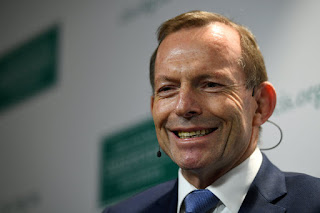The former PM is back on the talking points, painting himself and Dutton as "reluctant challengers" and orating about "the betterment of mankind".
Abbott was scheduled to speak on the vexed subject of immigration, after his calls for a national reduction. But given the events of the past seven days, it was only logical for him to provide his side of the #libspill story. As expected, he also was totally unrepentant.
Politics today is better than it has been in the past few days. Peter Dutton was a most reluctant challenger last week, just as I was back in 2009. Peter Dutton was someone who, above all else, wanted to change policy and not change leader.Abbott almost seemed to be taking credit for the rise of Scott Morrison who, he claimed, had restored the government to
... that sensible centre-right Liberal conservative mainstream ...of economically liberal and socially conservative.
Abbott was in no mood to compromise on key areas of policy such as energy, social security and immigration either. Listening to the way he spoke, one could almost think he was auditioning for the role of leader again. He insisted that energy policy under the new administration will be designed
... to cut price, not to cut emissions … the important thing is to get price down and let emissions look after themselves.Abbott declared himself no believer in
... the green religion.To applause from the well-heeled crowd, Abbott went on to declare that social security must be more
... like a trampoline than a hammock.The former PM seemed pleased with Alan Tudge’s appointment as Minister for Cities, Urban Infrastructure and Population. However, it seemed he didn’t quite understand Tudge’s portfolio. He repeated his “Team Australia” mantra, saying:
... immigration will go hand in hand with integration and in particular the stress for all primary applicants will be on having a job and joining our team and making a contribution from day one.In other words: new migrants will again have higher expectations placed upon them than the rest of us.
Abbott said that under Morrison, the policy contest will be much sharper than under Turnbull. He claimed a key weakness of Liberals in recent times has been “seeking a false consensus rather than prosecuting a real contest”. Abbott said such an approach made little sense in a world where political differences are becoming wider, not narrower.
He closed his presentation, astonishingly, with an observation from Ben Chifley:
Our great objective is not to make someone premier or prime minister. It’s not putting sixpence more or less in someone’s pocket. It is working for the betterment of mankind. Not just here but wherever we can lend a helping hand.The audience didn’t seem to mind. Apart from the journos, the audience was all nods and smiles. Among them was Maurice Newman, who was a member of PM Abbott’s Business Advisory Council and is highly sceptical of the existence of climate change.
Abbott claimed his objective has always been to work to help others achieve their best selves. We didn’t see much evidence of that last week.
First published in Crikey on 28 August 2018.













